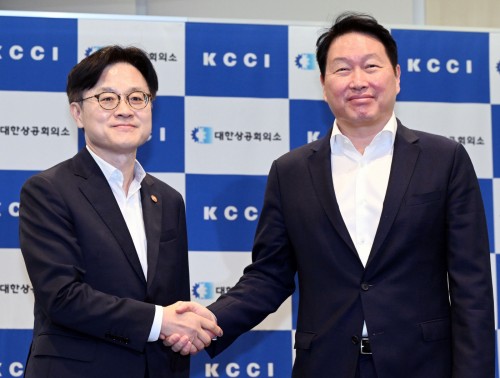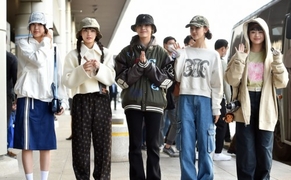 |
| Kim Jeong-gwan (left), Minister of Trade, Industry and Energy, shakes hands with Choi Tae-won, Chairman of the Korea Chamber of Commerce and Industry, before a meeting at the KCCI headquarters in Jung-gu, Seoul, on August 4, after returning from Korea–U.S. tariff negotiations on August 1. / Photo by Park Sang-seon |
The government is engaging in close communication with businesses to coordinate strategy following the conclusion of Korea–U.S. tariff negotiations. Kim Jeong-gwan, Minister of Trade, Industry and Energy, who returned from Washington after final talks, began his first week back with a series of meetings with major business leaders, including Choi Tae-won, Chairman of the Korea Chamber of Commerce and Industry.
With a total of $350 billion in U.S.-bound investment planned, the government aims to secure opportunities for strategic industries such as shipbuilding, automotive, semiconductors, and biotechnology to enter the U.S. market, while boosting corporate competitiveness through tax incentives and financial support.
On August 4, Kim held a "Korea–U.S. Trade Strategy Round Table" with major economic organizations, industry associations, and academics. Before the meeting began, he stood and bowed, expressing gratitude to the business community, stating, “This outcome was possible thanks to the direct and indirect support of our business leaders.”
Kim pledged to leverage the agreement to strengthen cooperation in strategic sectors and open new pathways into the U.S. market. He added, “In response to tariff measures, we will implement follow-up support measures to address export challenges, pursue alternative markets, and provide tax and capital support, while steadily advancing mid- to long-term industrial competitiveness.”
Both government and industry now face the task of coordinating follow-up issues through upcoming Korea–U.S. summits, while devising sector-specific responses and detailed investment plans to counter the impact of tariffs.
Later that day, Kim held separate talks with Choi Tae-won and Son Kyung-sik, Chairman of the Korea Employers Federation. During the meeting, Choi cautioned, “It is premature to conclude the negotiations are fully complete. We need more detailed planning to align our industrial strategy and trade environment with the current U.S. tariff situation, and to establish a new industrial map.”
Kim likened the negotiations to surgery, stating, “If the patient has just undergone surgery, there is still the risk of relapse, medication to take, and follow-up care to manage. We will overcome these challenges together with our companies.” He added, “We will work together on industrial restructuring, AI, and other issues to ensure they become drivers of our national industrial competitiveness.”
Most Read
-
1
-
2
-
3
-
4
-
5
-
6
-
7





















